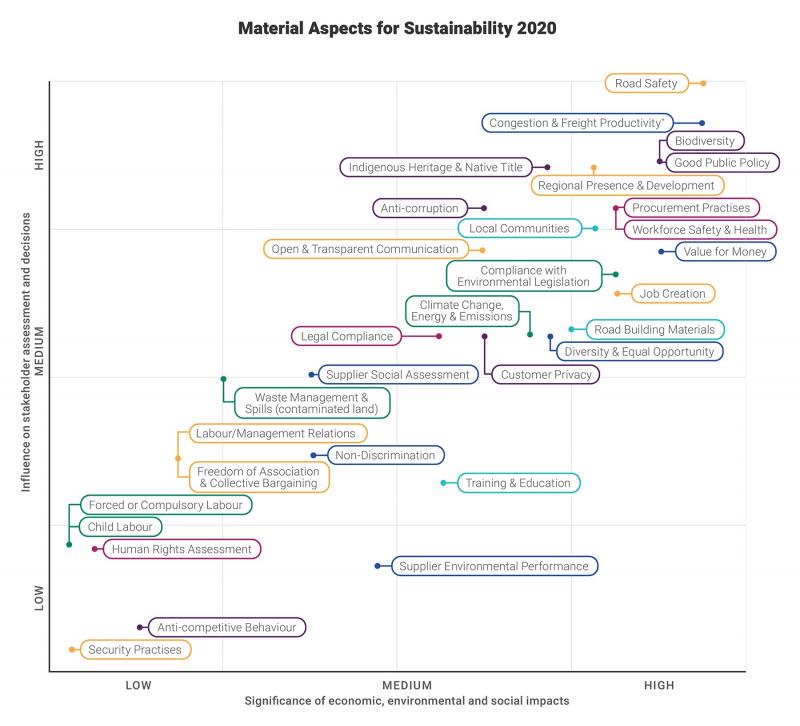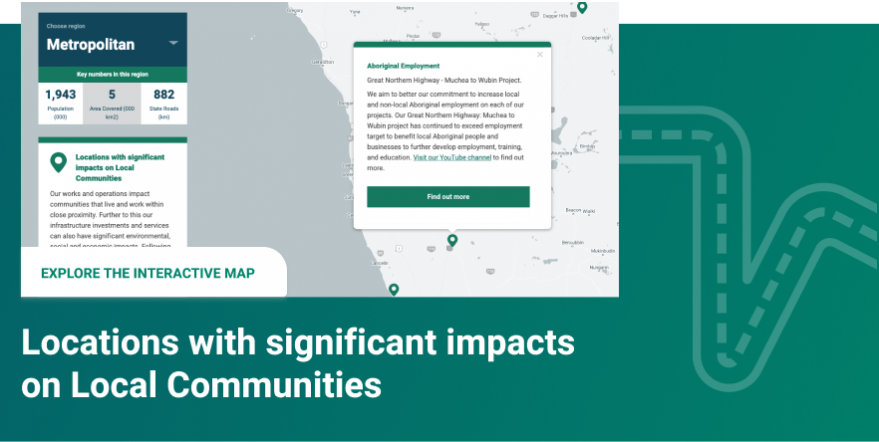Our Sustainable Approach and Defining Materiality
Our Sustainability Policy establishes a clear set of principles focused on creating lasting benefits socially, economically and environmentally.
It reflects our maturity and aligns with the sustainability focus and outcomes identified in Keeping WA Moving. We developed the policy in consultation with our portfolio partners and industry stakeholders, and it is underpinned by six key aspects:
1. sustainable transport
2. climate change
3. environmental footprint
4. behaviour
5. governance and performance
6. funding and financial matters
These key aspects help us translate and define our sustainability priorities and this flows through to the actions we take to deliver our road network. Corporate Executive receives quarterly sustainability reports to ensure we stay on track and as a check that our policy is delivering value for all Western Australians. Further information on our approach to sustainability, including our policy is on our website.
Defining Materiality
We ensure the relevance and validity of all areas of our business and stakeholder relations through a biennial desktop materiality review and internal stakeholder prioritisation workshops. These results are reported to Corporate Executive.
The review is conducted using a five-step process, informed by the Global Reporting Initiative (GRI) tests for materiality:

- Step 1 - Analyse the inputs
- Step 2 - Identify and interview stakeholders S
- tep 3 - Ask stakeholders to score issues
- Step 4 - Produce materiality matrix
- Step 5 - Sense check
The analysis stage draws from our corporate and legislative commitments, key risks, corporate stakeholder engagement processes, media and Ministerial topics and our peers’ reporting practices.
The Matrix shows the results of our five-step materiality process, indicating what is important to our community and stakeholders. For a list of our stakeholders, please see our Additional Environmental and Sustainability Disclosures.

This report is prepared in accordance with the GRI principles of sustainability context, materiality, completeness and stakeholder inclusiveness, our value chain and the requirements specified in the Public Sector Commission’s Annual Reporting Framework.A GRI Content Index is available for reference in the Downloads section.
Addressing our Most Important Material Issues
Our approach to addressing our top material issues and alignment with Sustainable Development Goals (SDGs) is shown in the table. More information on how these topics relate to Global Reporting Initiative (GRI) indicators including the GRI Content Index and the SDGs can be found in the Downloads section.
| Material Issues | Key Impacts | Key Resources Affected | SDG Alignment | |
|
Road Safety |
Western Australia’s road death statistic, 6.2 road deaths per 100,000 population, is the poorest of the mainland states – about 33 per cent above the national average. We believe no one should die or be seriously injured on our state’s road network, and we will manage the network for all road users to minimise the likelihood of road trauma. |
Customers Network performance Assets Our people Know-how | ||
|
Congestion and Freight Productivity |
It is one of our core objectives to reduce the impacts on our community and economy from congestion on the road network and to provide more efficient access for our freight customers. |
Customers Network performance Assets Our people Know-how | ||
|
Good Public Policy |
As a statutory authority we rely on our resources and know-how to ensure we have clear, transparent and strong governance approaches that prevent undue influence in the administration of our role and ensure swift, efficient and effective implementation of government policies and strategies. |
Customers Assets Our people Know-how | ||
|
Biodiversity |
Our state is widely recognised as having unique flora and fauna and our actions have the potential to cause negative impacts in sensitive and protected environmental areas. |
Natural resources Our people Know-how Assets Customers | ||
|
Workforce Safety and Health |
Our work environment means that our people, suppliers, partners and customers often interact with the road environment, moving traffic and heavy machinery in order to deliver our services. |
Customers Our people Know-how Assets Network performance | ||
|
Value for Money |
We must make effective use of the government funding we receive to deliver our services to the community. |
Customers Assets Our people Know-how Financial capital | ||
|
Regional Presence and Development |
We operate across a vast and isolated state and our rural operations can have significant impacts on regional towns, communities and their economies. |
Customers Assets Our people Know-how Financial capital | ||
|
Compliance with Environmental Legislation |
In some circumstances, our activities are subject to state and federal environmental legislation. We may face penalties, reputational damage or loss of stakeholder and community confidence if we do not comply with our environmental obligations. |
Natural resources Our people Know-how Assets Financial capital Customers | ||
|
Indigenous Heritage and Native Title |
We acknowledge the traditional custodians of Western Australia’s lands and aim to protect Aboriginal cultural values wherever possible. We recognise that there is an unacceptable level of disadvantage in living standards, life expectancy, education, health and employment experienced by Aboriginal peoples. We are committed to making a change in our industry and progressing reconciliation. |
Our people Assets Customers | ||
|
Local Communities |
Our works and operations impact communities that live and work within close proximity. Acquisition of property, construction noise and business continuity are examples of issues that need to be carefully managed, require stakeholder engagement and impact our role as good neighbours. |
Customers Our people Know-how Assets | ||
|
Procurement Practices |
We rely on our supply chain to deliver tasks critical to our overall success. We engage with a large number of suppliers of varying characteristics. In 2019-20 we engaged directly with more than 4,900 suppliers and made in the order of $1.753 billion in payments. We are aware that our terms of payment can impact the cash flow and solvency of various businesses and seek to minimise those impacts. We also leverage our relationship with our suppliers to deliver priority government policy which includes training, indigenous engagement and supporting local business. |
Our people Know-how Customers Assets Natural resources | ||
|
Job Creation |
During this unprecedented time and the associated economic ramifications of COVID-19, we’ve been asked to increase our delivery capability as part of an overall strategy to stimulate the creation and maintenance of jobs within the economy. |
Our people Know-how | ||
Our works and operations impact communities that live and work within close proximity. Open our interactive map to understand a little more about these impacts and what we are doing in these areas.

